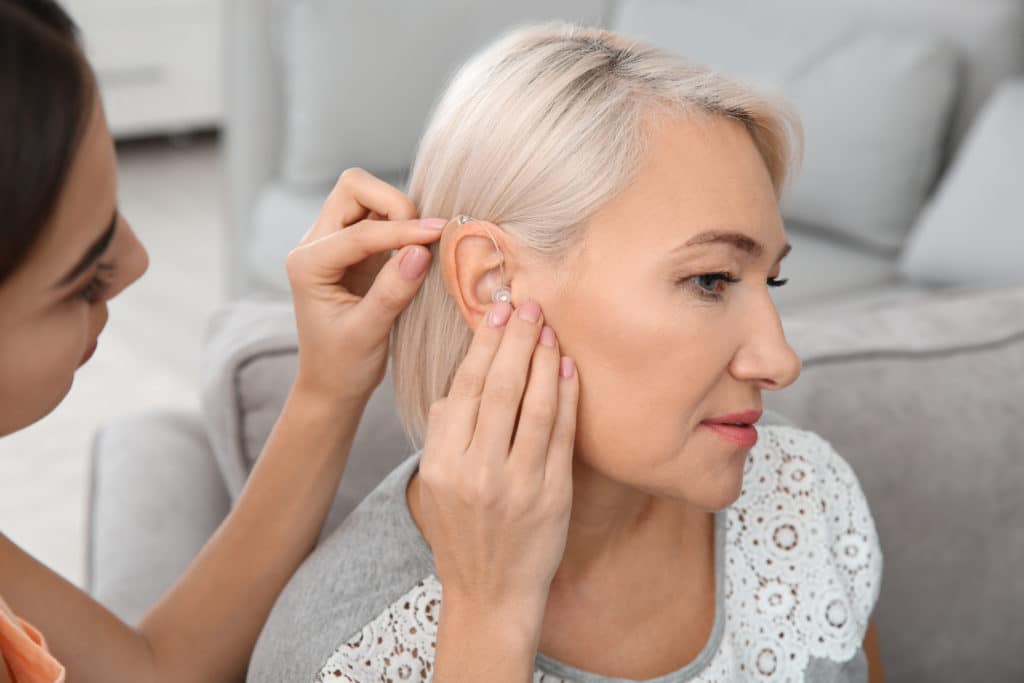
While it’s no surprise that men and women communicate differently, you might be surprised to know that they are at different hearing loss risks. Not only are men and women predisposed to various medical conditions, but many of these conditions put them at risk for hearing loss
For decades, sociologists and psychologists have studied the differences between men’s and women’s brains and their differing communication styles for spouses. It’s helpful to know these differences for long-term understanding and intimacy. In the workplace, it can help with inter-office communications and efficiency. Generally speaking, men communicate as a means for intentional gain; to solve a problem or lean information. Women communicate to understand emotions and to explore and organize thoughts and experiences.
Signs of hearing loss
There are two kinds of acquired hearing loss; conductive and sensorineural. Conductive occurs when there is a mechanical issue in the outer or middle ear. Due to buildup of wax, damage to the small bones within the ear, or damage to the eardrum. Sensorineural hearing loss, the most common, happens when the tiny, non-replaceable hair cells in the inner ear (responsible for detecting sound) become damaged or have died. This kind of hearing loss is often caused by childhood ear infections, old age, use of certain medications, and noise exposure.
Some symptoms of hearing loss:
- Often asking people to repeat themselves
- Having trouble hearing in groups
- Failing to hear someone talking from behind
- Frequently turning up the volume on the television or radio past a “typical volume”
- Difficulty hearing over the phone
- Trouble hearing at the movies
- Problems hearing or following conversation in situations with background noise or excessive noise
- Avoidance of social gatherings or interactions
Hearing loss in Men

Approximately 36 million Americans have hearing loss (according to the National Institute on Deafness and other Communication Disorders). Men are twice as likely to have hearing loss than women (among adults ages 20-69). An increasing number of young men are one of the theorized primary reasons for these differences in occupation.
Noise-Induced Hearing Loss
Noise-induced hearing loss occurs when someone is exposed to loud noise over a long time, resulting in temporary or permanent damage to the inner ear. Men are more likely to work in noisy occupations such as construction, agricultural, manufacturing, or automotive/mechanical environments. An estimated 24% of hearing loss in men, according to the Center for Disease and Control (CDC), 44% of carpenters and 48% of plumbers report being hard of hearing. Additionally, NIHL is the most commonly reported injury among veterans and those returning from military service.
Recreational activities also tend to be louder for males: motorcycles, automotive hobbies, hunting and using firearms, loud sporting events. These activities can all contribute to noise-induced hearing loss, which is the second leading cause of hearing loss for both genders.
Medication
Chronic use of ototoxic medication has also shown links to hearing loss in men. Certain medications are known to be ototoxic: harmful to the ear, resulting in dizziness, nausea, hearing loss, and tinnitus. Many anti-inflammatory drugs such as acetaminophen and aspirin have been ascertained as ototoxic. Studies have shown that men in younger groups (50-59) who take aspirin regularly are more likely to experience hearing impairment than those who do not.
When it comes to communicating with others about their hearing difficulty, men are less likely than women to let others know about the issue. A Harvard study in 2015 discovered that not only are women twice as likely to let others know about their hearing impairment. They are also significantly more likely to offer solutions such as “please speak to my right side, my left ear doesn’t hear as well.” Versus most men who, when disclosing hearing difficulty, will say, “I have problems hearing, without offering solutions or communication ques.”
Hearing loss in Women

While men are twice as likely to have hearing loss, women are also at risk of developing one. There are many conditions that women are predisposed to that can cause hearing difficulty. Many chronic illnesses display links to hearing impairment in women.
According to the American Heart Association, 80% of sudden cardiovascular events occur in men. Heart disease is still the number one cause of death for women. Women who have a family history of heart disease should have their hearing regularly tested every two years after age 50. In 2009, a study at Medical College in Milwaukee, Wisconsin, found that audiogram patters closely correlated to cerebrovascular and peripheral arterial disease. The researchers recommended that patients diagnosed with low-frequency hearing loss be “regarded as at risk for cardiovascular events” and referred to the appropriate medical professionals. For both men and women, taking care of cardiovascular health by altering their diet, lifestyle is essential.
Cancer
Hearing loss can also be a side effect of breast cancer treatments. , Many oncological drugs are unfortunately ototoxic. Patients undergoing chemotherapy should have a baseline hearing test before treatment. In most cases, hearing impairment from chemotherapy is temporary. Still, it can be permanent due to the radiation and ototoxic medications taken concurrently. For many oncology patients, tinnitus is a frequent side-effect of those treatments.
Bone Disease
Osteoporosis has also been linked to hearing impairment. According to the National Osteoporosis Foundation, 8 out of the 10 million Americans with osteoporosis are women. As they age, women experience loss in bone density due to a reduction in estrogen, which protects bones. Studies have found links between osteoporosis and gradual hearing loss due to the bones’ demineralization in the middle ear. For patients diagnosed with osteoporosis, getting a baseline hearing test can be necessary to observe and manage their hearing damage.
Preventing Hearing Loss
Age-related hearing loss. Also known as presbycusis, accounts for many cases of hearing impairment in both men and women. However, the genders experience different kinds of hearing loss. Men attend to have high-frequency hearing loss, meaning they struggle to recognize sounds like consonants in speech. Women are more prone to low-frequency hearing loss, where they have trouble hearing vowels.
In both cases, hearing loss can affect all ages and genders. For those who work in loud environments or have hobbies that place them in noisy situations, hearing loss can be prevented.
Over time, exposure to loud noises can damage the delicate hair cells within the ear’s cochlea. These hairs vibrate and send nerve signals to the brain for sound interpretation. Damage to these cells eventually causes hearing loss. Patients should take care to limit the time spent in noisy scenarios, even at home. Listening to headphones at a loud volume or watching television at a high volume can contribute to damaged hearing. It is also a good idea for patients to wear hearing protection when they are in noisy environments, shooting ranges, construction sites, or even using the lawnmower.
Salem Audiology Clinic offers diagnostic evaluations for hearing loss in people of all ages. Founded in 1982, our mission has always been to deliver unbiased information to the hearing impaired and provide the same care and service we would want our loved ones to experience.
For testing or to schedule an appointment with an audiologist,
Call us at (503)588-1039
